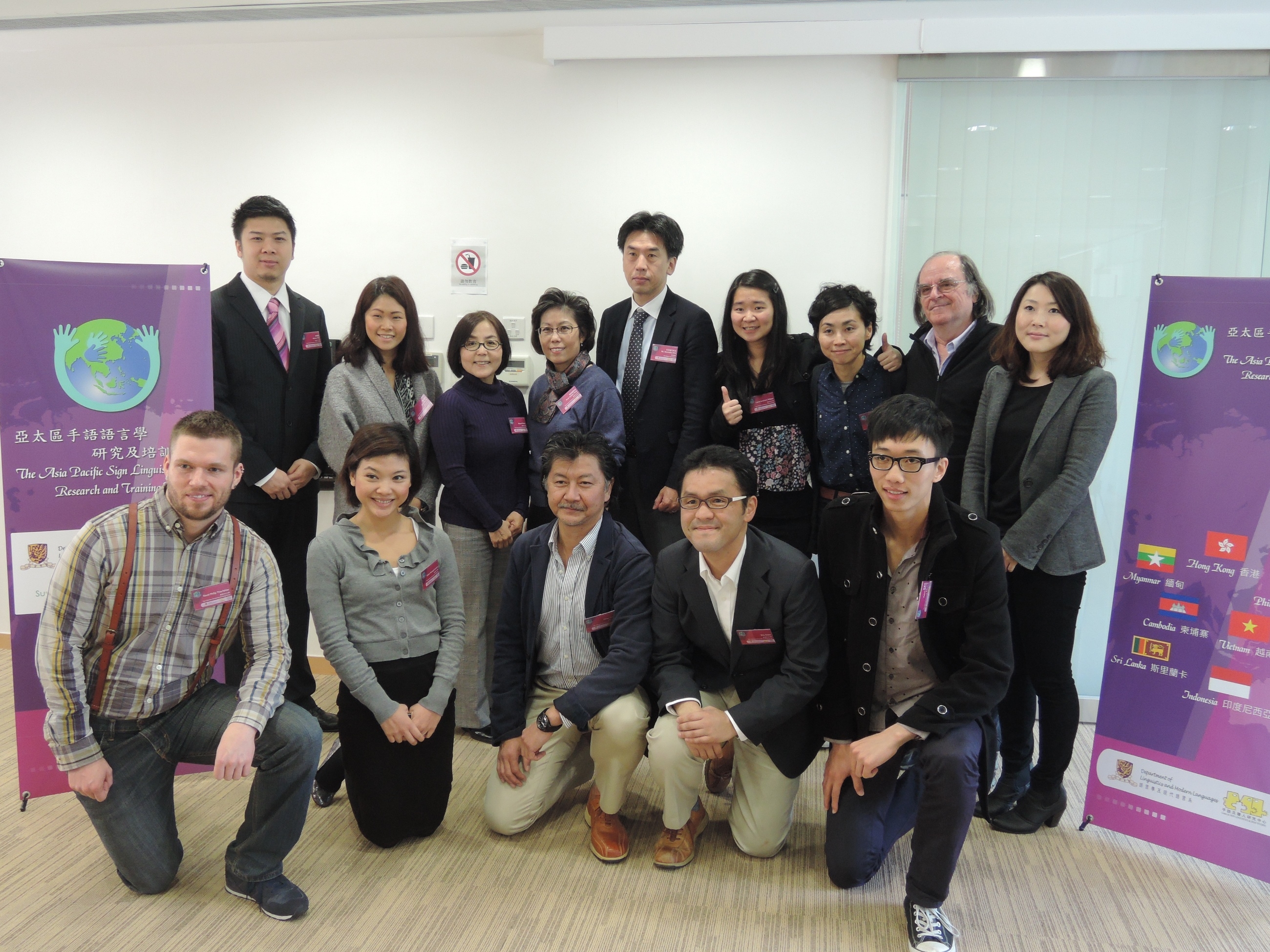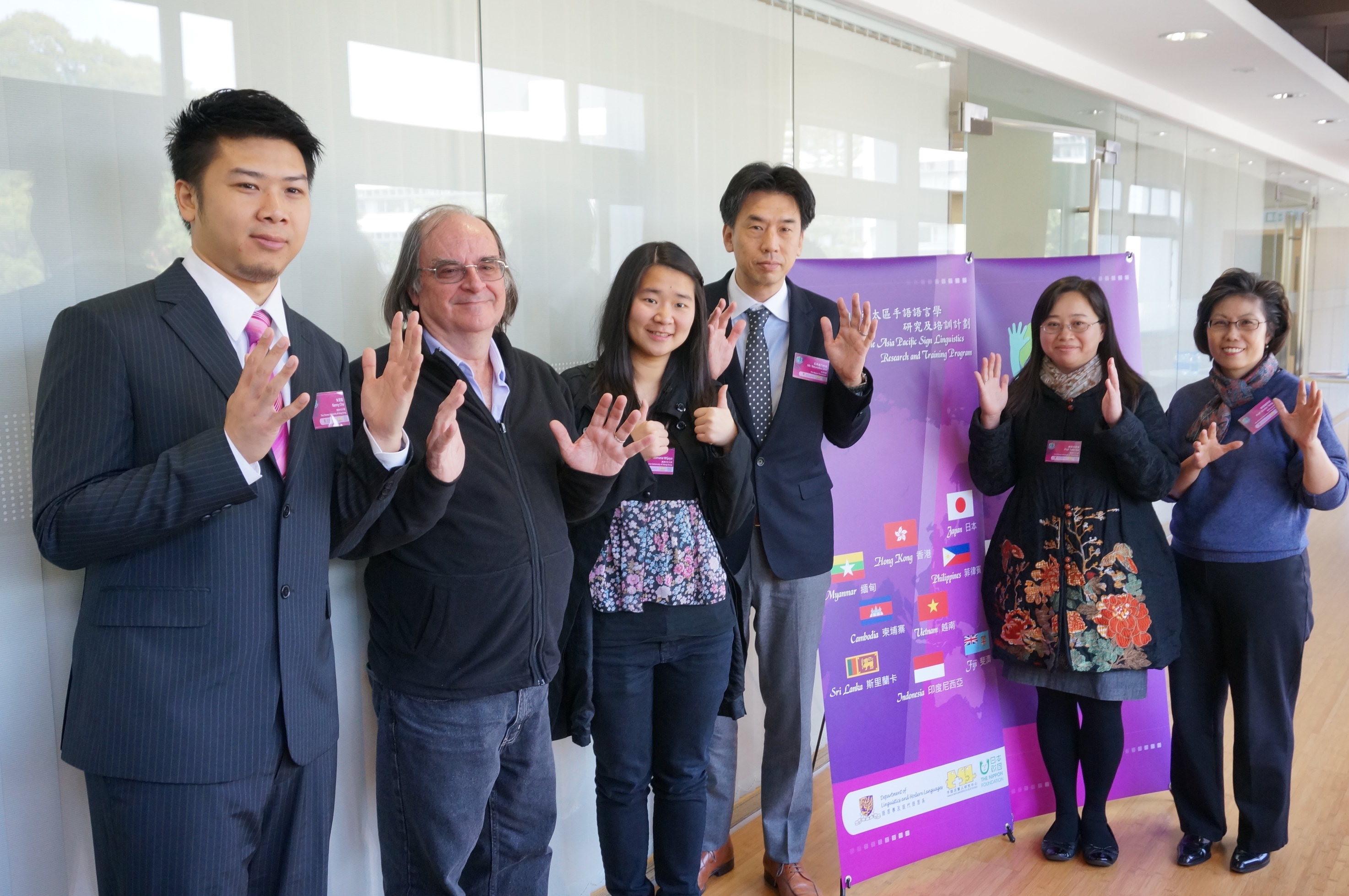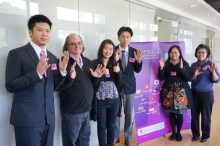CUHK
News Centre
CUHK Establishes Higher Education Support System and Sign Linguistics Scholarship for Asian Deaf Students
Pursuing university education in Asia is not at all easy for signing deaf adults. In Hong Kong, the lack of learning support at the tertiary level has made some deaf students give up their academic pursuit. Even universities also find it difficult to solicit resources to support students with special needs. Upon the admission of two deaf students into the BA in Linguistics Programme of The Chinese University of Hong Kong (CUHK), who graduate from the Higher Diploma in Sign Linguistics and Sign Language Teaching at CUHK, The Nippon Foundation has pledged to fund their education, as well as to fund CUHK to develop a system of learning support for the deaf in higher education, which include sign interpretation, note-taking, and video capturing of lectures. The Nippon Foundation has also recently pledged donations to set up the first sign linguistics scholarship for Asia at CUHK, supporting Asian students to pursue related training at the Bachelor’s, Master’s and PhD levels.
Open the doors of higher education to Asian deaf adults
In 2003, the Centre for Sign Linguistics and Deaf Studies (CSLDS) at CUHK and The Nippon Foundation initiated the Asia Pacific Sign Linguistics Research and Training Program (the APSL Program). Years of efforts in implementing research and training by the CSLDS have led to sign linguistics research being established gradually in eight cities/countries in the Asia Pacific region, funding for which was provided by The Nippon Foundation. In addition to supporting deaf students to receive training in sign linguistics and sign language teaching in the APSL program, The Nippon Foundation has been providing financial support to hearing students to study for an MA in linguistics (sign linguistics stream) at CUHK. Following the lead of Prof. James Woodward, Prof. Sze Yim Binh and Prof. Tang Wai Lan, deaf adults are applying the knowledge and skills they have learned to document sign languages in Vietnam, Cambodia, The Philippines, Hong Kong, Sri Lanka, Indonesia, Fiji and Japan. This work on sign language documentation is the first ever in Asia to be conducted by professionally trained deaf people. It builds a strong foundation for the future development of sign linguistics in the region. The program also enables deaf adults to equip themselves with the sign linguistics knowledge and sign language teaching skills necessary to teach their native sign languages at the university level. These pioneering efforts aim to provide support to the development of disciplinary studies in sign interpretation and deaf education.
The program continues to open the doors of higher education to Asian deaf adults in order to promote their academic and social status. Ms. Laura Lesmana Wijaya from Indonesia and Mr. Chu Kwan Ngai Kenny from Hong Kong, after graduating from the Higher Diploma in Sign Linguistics and Sign Language Teaching program, were successfully admitted into the BA in Linguistics program at CUHK. They are the first two deaf students to be admitted into a linguistics program at CUHK. In the near future, they will team up with deaf graduates of the APSL program and hearing graduates of the MA in Linguistics program to shoulder the future development of the discipline of sign linguistics in the Asia Pacific region. This will ultimately create a positive impact on the development of education for the deaf in the region.
The Nippon Foundation has been sponsoring Ms. Laura Lesmana Wijaya and Mr. Chu Kwan Ngai Kenny to receive their university education and, additionally, funding the CSLDS to coordinate the learning support services for them. It is also the first time that the CSLDS has provided sign language interpretation in classes at CUHK. In addition, the CSLDS has begun to explore how to utilize the note taking services CUHK has been developing in recent years for students with special educational needs; they also explore the use of an automated lecture recording system introduced at CUHK to enhance teaching and learning in general. The support services facilitate our two deaf students in accessing information efficiently and accurately in class, just like their hearing peers. The e-learning platform of the university enables them to review the notes and recordings after classes as well. With the funding and support from The Nippon Foundation, the CSLDS will test this system of learning support for the deaf in higher education and gradually establish a scheme for sign language interpreter training. It is hoped that as this system of support matures, universities in Hong Kong and other parts of Asia can make reference to it when providing support services to deaf people with different educational needs and thus ensure they receive equal access to higher education.
Prof. Gladys TANG Wai Lan, Director of APSL Program said, ‘Today marks the success of sign language researchers in preparing a new generation of Asian deaf and hearing sign language research professionals, a goal we’ve been working toward at CUHK for the past 13 years. This goal was developed in response to the United Nation Convention on the Rights of Persons with Disabilities, which calls for nations to ensure the right of deaf people to receive their education through sign language.’
Scholarship scheme expanded to MPhil and PhD degrees in sign linguistics
The Nippon Foundation and the CSLDS are gradually realizing the goal of establishing a research and training unit for sign linguistics and sign language teaching at Asian universities in order to pave the way for the future development of these fields as well as the field of deaf education. Also with funding from The Nippon Foundation, the APSL Program has partnered with other universities in Asia in order to form teams of sign language researchers cum teachers in order to conduct sign language research and deaf training locally. With The Nippon Foundation’s scholarships, two hearing Indonesian students from the University of Indonesia and one Sri Lankan student from the University of Kelaniya have successfully completed the MA Program in Linguistics at CUHK between 2012 and 2014. They have returned to Indonesia and Sri Lanka respectively with the other deaf adults trained in our program to assist the establishment of a sign linguistics research unit and to deliver training in related areas. Following the success in building a research team for Indonesia and Sri Lanka, the APSL program shall witness the graduation of two Japanese deaf students from the higher diploma program and two Japanese hearing students from the MA in Linguistics program in the summer of 2015. As a team, they will bring their training experience and research output back to their home country to further develop sign language research and sign language teaching in Japan.
To accelerate development, The Nippon Foundation has made a new initiative of expanding the current scholarship scheme to sponsor Asian students to come to CUHK to pursue MPhil and PhD degrees in sign linguistics. When the learning support service system matures to better accommodate deaf students, CUHK will become the first university in Asia that supports Deaf students in pursuing sign linguistics training at the bachelor’s, master’s and PhD levels.
To support deaf development in Hong Kong, mainland China and Asia, the CSLDS of CUHK will continue to lead Asian universities in developing a consortium to support collaborative training and research in sign linguistics, sign interpretation and deaf education. Additionally, now more deaf people will be able to receive equal education and job opportunities thanks to the development of educational support services. CUHK continues to serve as a hub for the field and takes the lead of such establishments in Asia.
The CUHK Asia Pacific Sign Linguistics Research and Training Program has supported hearing and deaf students coming from eight countries/ regions.
(From left) Mr Kenny Chu, a deaf student of BA in Linguistics, CUHK; Prof James WoodWard, Co-director, Centre for Sign Linguistics & Deaf Studies, CUHK; Ms. Laura Lesmana Wijaya, a deaf student of BA in Linguistics, CUHK; Mr Yasunobu Ishii, Director of Disability Program, The Nippon Foundation; Prof Felix Sze, Research Assistant Professor, Department of Linguistics and Modern Languages, and co-principal investigator of APSL Program, CUHK; and Prof. Gladys Tang, Professor, Department of Linguistics and Modern Languages,and Director of APSL Program.







